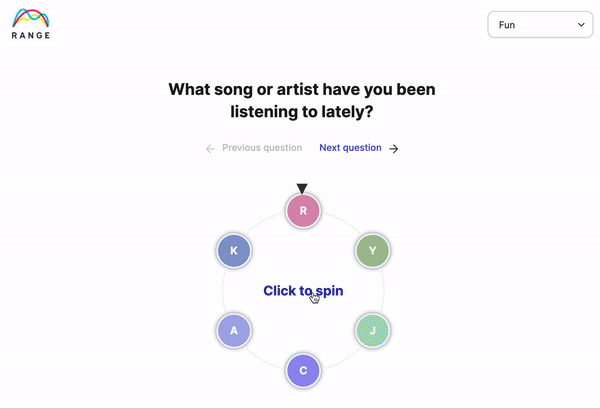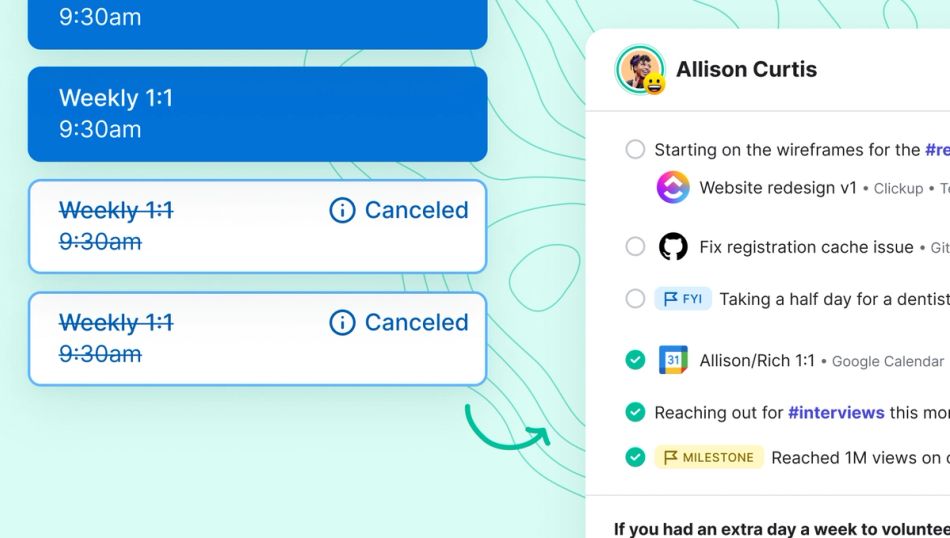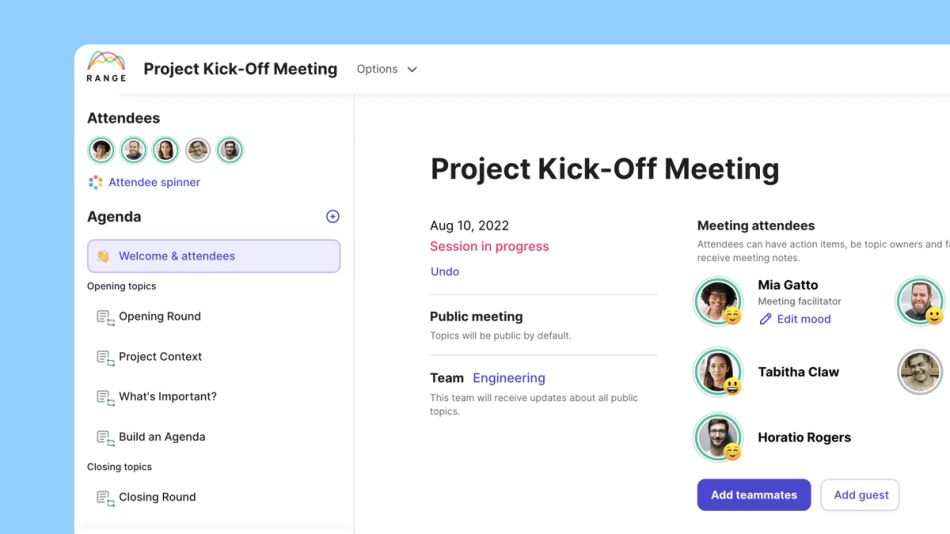Progress reports and status updates are a thing of the past. If you want to really keep a pulse on your team — and help them feel valued, empowered, and connected — it’s all about check-ins.
What are check-ins? Simply put, check-ins are a way to understand how teammates are doing and how work is moving forward in a way that fuels trust, accountability, autonomy, and belonging. In fact, 39% of people say they feel a greater sense of belonging when teammates check in on how they’re doing both personally and professionally.
Want stronger connections on your team? Want next-level teamwork? It starts with check-ins — and asking the right check-in questions is the fastest way to get there.

No sign-up required
Try our (free) icebreaker generator
Take a spin! Start your next meeting with one of these icebreaker questions. It works the same way in Range.
What are the best check-in questions?
General check-in questions
When to use these check-in questions: 1:1 meeting, team meeting, async check-in
Why it’s important: Asking for help doesn’t always come naturally, so as a leader, it’s your job to proactively reach out to see what your team needs and how you can help them get there.
- How are you feeling today?
- How can your team support you today?
- What are your top 3 priorities?
- What could get in the way of you achieving your goals this week?
- What wins or progress are you celebrating this week?
- What are you most excited about tackling next week?
- Are you getting the resources or support that you need?
- What do you want that support to look like?
Personal progress check-in questions
When to use these check-in questions: 1:1 meeting, project check-ins, async check-ins, reviews & feedback sessions
Why it's important: These check-in questions can help surface issues you might not have been aware of otherwise and step in to help on your team’s behalf. It can also help identify growth opportunities or ways to improve your team’s process.
- What challenges are you currently facing?
- Do you need help addressing those challenges?
- Are there any tasks you need help with?
- Do you feel like you’ve made progress on your projects this week?
- What do you think helped or hindered your progress?
- How do you feel about your work-life balance?
- What’s something you’d like to prioritize more in the coming weeks?
- How do you feel about the timelines you’re working towards?
- When do you feel most effective?
- How can we create more of an opportunity for you to work in the ways you like?
- What’s a major motivator for you right now?
- How can we work to build more of that into your daily or weekly mix?
- Are you receiving enough feedback?
- How do you prefer to receive feedback?
Workflow check-in questions
When to use these check-in questions: 1:1 meeting, project check-in, new hire check-in, sprint or project retro
Why it’s important: Gaps in information and inadequate tooling can slow projects down and speed up feelings of frustration and burnout. Checking in with teammates on these topics regularly helps raise flags early on and can bring new solutions to light.
- Do you have the tools and information you need to do your work?
- Is anything missing in your workflow? How can we improve this?
- What feedback can you provide to improve our processes overall?
- What have you seen work well on others teams you’ve been a part of?
Growth and development check-in questions
When to use these check-in questions: 1:1 meeting, quarterly or annual reviews, personal reflections
Why it’s important: Your team wants to know you’re looking out for them — both in their day-to-day work and in their career. Asking big picture career questions can show team members that there's a place for them to grow at the company and help you identify opportunities to challenge them and grow their skill sets.
- How can the company help you achieve your career goals?
- What’s a development area you’d like to focus on right now?
- Are you comfortable with how your role has changed over time?
- What’s your favorite part of your current role? What’s your least favorite?
Meeting check-in questions
When to use these check-in questions: Team meeting, 1:1 meeting
Why it’s important: Letting folks weigh in on what they want to spend time on and what they don’t will help you run a more effective meeting by allowing you to allot time to things people feel passionately about, and move through other topics more quickly.
- What topic from the meeting agenda should we spend the most time on
- Are there any other topics you’d like to add to today’s agenda?
- What should we discuss in our next meeting?
- What was most helpful in today’s meeting?
- What would make this meeting more helpful to you?
- Are there things that are working well that we should keep doing?
Remote work check-in questions
When to use these check-in questions: 1:1 meetings, retro meetings, async check-ins
Why it’s important: Understanding your teammates’ remote work situations can foster empathy and help you as a manager provide the tools and support they might need.
- Do you feel comfortable and productive at home?
- What might help make your WFH setup a little more comfortable?
- Are there ways of operating we could adjust as a team that would make remote work more successful?
- What’s something we could change as a team to make remote work better
- Are there things that are already working well that we should do more of?
- What types of team building activities would you like to see more or less of?
Team building check-in questions
When to use these check-in questions: Team meeting, async check-in, 1:1 meeting
Why it’s important: You’ll learn a little about your colleagues and also be armed with some good intel on how you might brighten their day after a busy product launch or hectic week.
- What helps you de-stress or unwind?
- What’s something you’re looking forward to this week?
- What are you not looking forward to this week?
- If money wasn’t an object, what would you do on your dream vacation?
- What's a movie you've watched 10 times or more?
🏙 Get even more team building questions.
What makes a good check-in question?
Not all check-in questions are created equal. Let’s take a look at some dos and don’ts when writing your check-in questions.
Check-in dos
- Keep it open-ended: Open-ended questions give space for teammates to share more freely and offer insights you may not have unearthed otherwise. As you write your questions, try to avoid ones that require only a simple yes or no answer — or include a follow-up question (ex: how or why) to dig a level deeper.
- Frame questions positively: Check-in questions should help your team feel reflective and empowered — not reprimanded. Instead of asking “Why didn’t you finish that product spec?” try something like “What’s getting in the way of doing your best work right now?” or “How can I help free up more of your time?”
- Get to know each other: Try including a team-building question that’s fun, thought-provoking, or simply just out of the realm of work to help folks open up and learn a bit about each other in the process. For example: “What’s your dream vacation spot and why?”
- Mix it up: Try asking different questions during different days of the week or times of the quarter. For instance, you might ask questions that help people plan and kick off the week on Monday and then more reflective questions on Friday.
- Think about your cadence: A good rule of thumb is that folks should be able to share some amount of progress each time around. If folks are repeating the same updates across multiple check-ins, it’s probably a sign you could move to a less frequent cadence.
When do you ask check-in questions?
Your team can benefit from using check-in questions in two different ways: during meetings and asynchronously.
Checking in during meetings
You can easily put check-in questions to work in your existing meetings. Think 1:1s, team meetings, project check-ins, retros, and planning meetings. Facilitating these questions in your meetings can get everyone more engaged and ensure your time together is most valuable.
Checking in asynchronously
Check-in questions can also happen asynchronously — and many teams choose to do them this way for flexibility. Teammates can answer and folks can read and engage with each other’s updates in their own time. Some situations where async check-ins work particularly well are:
- When your team is fully remote and spread across time zones
- When you want to strengthen alignment but don’t want to add more meetings to the mix
- When you want to foster team bonds without scheduling an all-day offsite or happy hour
- Collecting ideas or gaining alignment before a meeting
Before you check in, check yourself
Check-in questions should serve your entire team, not just the manager or lead. So before posing them, it’s helpful to build in some intentionality to your process.
Ask yourself:
- Who does this check-in question benefit — me or the whole group or an individual?
- Is what I’m asking reasonable? Can someone answer it briefly? Or am I creating a major disruption to their workflow?
- What value does this question provide? Am I asking for the sake of asking, or will it help the team to know this?
Check-in don’ts
- Focus only on progress: Sure, check-in questions are great for tracking progress — but they should be about more than that, too. Think of check-ins as an opportunity to better understand your team through open feedback and dialogue. It’s about understanding people’s well-being, team dynamics, and what is and isn’t working to help the whole team thrive.
- Micromanage: Checking in with your team is different from checking up on them (this Harvard Business Review article goes deeper on this point). Check-in questions should help your team feel empowered, autonomous, and valued — not micromanaged.
- Forgot to respond: Check-ins are about two-way communication — not just an IC reporting up. If you’re doing check-in questions asynchronously, make sure you carve out time to respond and engage with them, even if it’s just a quick. 🎉 It’ll show your team that you’re actively paying attention to what they’re working towards.
- Assume everyone has all the context: Instead, if you’re doing asynchronous check-ins, encourage folks to provide extra context within their responses. Linking to things like a project spec, product roadmap, or Jira and Asana tasks makes it easier for anyone who’s reading to follow along.
- Ask for too much: Questions should provide some guidance, but not prompt teammates to write a novel or share for 5 minutes. Aim for questions that someone could answer in a couple of sentences. Otherwise, we are back to broken standups.
How do you check in with your team?
Ready to try it for yourself? You got this. 💪
The questions above are a solid starting place. Try asking 2-3 at your next 1:1 or team meeting and build out your process from there. You can tailor your check-in questions based on when you’re using them and what your team responds best to. Approach it as an experiment and be open to collecting feedback and iterating as you go.
Range Check-Ins
For teams new to check-ins, or looking to level up your game, Range makes it easy — with check-in prompts and daily reminders to make it an easy-to-follow habit.

- Reduce meeting load by keeping every team member informed and connected
- Easily share your work plan and what you accomplished
- Check-in on a personal level and stay in-the-know – wherever you are.
- Integrate tools from across your workflow, including Github, Google Docs, Google calendar, and more
- Add tasks from your project management tools
- Share updates via Slack or Microsoft Teams
Meetings in Range
For meetings, Range automatically pulls in check-in questions at the beginning and end of your time together. It’s a lightweight way to boost engagement and help the whole team feel more connected.

- Easily facilitate balanced discussions that make every meeting worthwhile
- Keep everyone included and on track with much less effort.
- Build agendas, record actions, and share notes automatically
- Create a recurring agenda for all the topics your team discusses every week from metrics to project updates.
- Empower discussion by building a collaborative agenda & spinning to select others to speak
- Easily document notes from each topic to keep everyone in the loop.
⭐️ Build camaraderie and connect with everyone on your team with async check-ins & meeting check-in rounds before the meeting starts.
⚡️Start with Range today.
Check-in Questions FAQs
Why are check-in questions important? 
Checking in with your team is one of the easiest ways to build a more open culture around communication. It strengthens trust and team bonds, and gives managers (and everyone else on the team) visibility into how everyone’s doing and how work is moving forward.
Asking how folks are doing on a regular cadence can help ICs feel heard and valued, and brings the team together too by learning snippets about what makes each other tick. It’s a way to build empathy and understanding, by getting to know your teammates on a more personal level.
What are the benefits of check-in questions before a meeting?
Your team can get a lot of out check-in questions. Here are some of the ways we’ve seen groups and organizations benefit from them.
The benefits:
- Improves visibility: Thoughtful questions can help you understand how your team is moving work from point A to point B so you can better support them through the process.
- Keeps projects on track: Since you’ll have greater visibility, it’s also easier to course-correct early on. Check-in questions can help you see if teammates need extra help and offer support or adjust timelines as needed.
- Fuels stronger teamwork: Check-ins help foster greater accountability and healthier communication — both of which are foundational to team dynamics and collaboration.
- Increases meeting participation: Posing a check-in question at the beginning of a meeting is an easy way to get everyone talking from the start. Research shows that if someone speaks early on in a meeting, they're more likely to stay engaged throughout.
- Prevents miscommunication: Check-ins let you check the pulse on team members' feelings. Maybe someone’s late on an expected deliverable or short to you in the team meeting. Rather than jump to conclusions, check-in questions can help reveal what’s going on: maybe a distraction at home or grogginess from a cold. Whatever the reason, understanding it can help mitigate conflict and build compassion.
- Improve team chemistry: Thoughtful check-in questions can also improve team dynamics by encouraging vulnerability, empathy, and psychological safety. They can reveal things you and your teammates have in common that you might not have stumbled upon otherwise.








